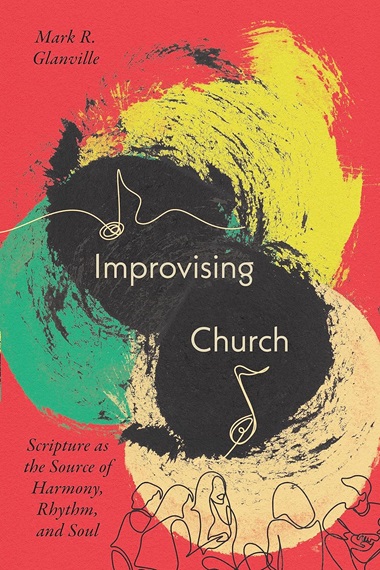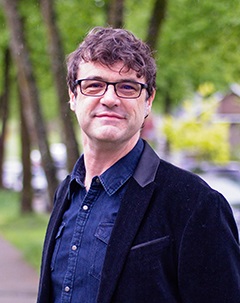 In his brand new book – Improvising Church: Scripture as the Source of Harmony, Rhythm and Soul (IVP, February 13, 2024) – Regent College scholar and accomplished jazz pianist Mark Glanville plays with a metaphor of improvisation to chart 12 themes as the key ‘notes’ on which Christian communities play as they bear witness to God in the world today.
In his brand new book – Improvising Church: Scripture as the Source of Harmony, Rhythm and Soul (IVP, February 13, 2024) – Regent College scholar and accomplished jazz pianist Mark Glanville plays with a metaphor of improvisation to chart 12 themes as the key ‘notes’ on which Christian communities play as they bear witness to God in the world today.
Building on these two dynamic traditions – jazz music and Christian community – Improvising Church unfolds a biblical, practical and inventive vision for churches seeking to receive and extend the healing of Christ.
Following is an edited excerpt from the book.
Renown missiologist Lesslie Newbigin reflected: “It is of the very essence of the church that it is for that place, for that section of the world for which it has been made responsible.” 1
Being for a place means more than running evangelistic programs; it is an orientation toward a local community from within that community, displayed in a deep investment of time and love in its individuals, families, and structures.
From this position of investment, we share the life-giving truth about Jesus, in a posture of dialogue. What would happen if you reframed the witness of your church as: ‘loving a place?’
Some years ago, we invited members of our church to photograph the places in our local area that they loved and that had meaning for them. Teenagers and children snapped pictures with their mobile phones. Disposable cameras were distributed to older members of the congregation who didn’t own camera phones. Grassy hills, ponds, cafés, shops and indigenous murals were lovingly photographed.
Twenty-five of these images were framed and hung in our church foyer. Our church motto, painted tastefully on a canvas, hung there too: “Making known the truth, hope and love of Jesus, here.” (We added the word ‘here’ to the motto.) In this way, each time the church gathered for worship we were reminded that Christ has called us to this place.
While reframing witness as loving a place may sound novel, it resonates with the biblical story. Steven Bouma-Prediger and Brian Walsh rightly reflect that we can summarize the arc of the biblical story as a movement from being placed, to displaced, to re-placed (think of the movement in the biblical story of creation–fall–redemption). 2
Think of how the Bible begins, for example. God placed the first humans in a particular place, namely a garden (Genesis 2:8). The Hebrew word for garden (gan) refers to a garden with discrete boundaries, such as a vegetable plot or royal garden (Deuteronomy 11:10; Jeremiah 39:4). God gave the first humans responsibility to steward that place (Genesis 2:15).
According to Genesis 2, humanity not only belonged in the garden, humanity also belonged to and with the garden. Adam, who stands for all of humanity at this point in the story, is taken from the adama, the ground (Genesis 2:7). The play on words – Adam and adama – demonstrates a mutuality of being, an intertwining of fates, between humankind and their ecosystems.
Yet because of human rebellion, humankind is cast out of the garden (Genesis 3:23-24). Our displacement from the garden is a fragmentation of human relationship with a place, a movement from somewhere to anywhere. In fact, not only Genesis 2, but the story of the whole Bible runs along the adamah, the ground, relentlessly connected to place.
Reflecting the value of place, the first Christians sought to be a servant of their particular city. They demonstrated compassion and sacrificial service. The Epistle to Diognetus, written at around AD 130, beautifully captures the early church’s sense that they were to be the compassionate heart of a city: “What the soul is in the body, that Christians are in the world.” 3
The first Christians thought of themselves as the ‘soul’ of the city. They were not concerned with political power, for they had no political power. Rather, their posture was shaped by the cross; that is, sacrificial service and spiritual power.
But what about us, today? A friend of mine, an expert on local housing initiatives, reflected to me: “Society is completely overwhelmed by global problems right now; we are paralyzed by global issues. So a church that is locally invested, for the life of the neighborhood, is very hopeful.” My friend is spot on. We cannot heal the world, but we can love one neighborhood in the name of Jesus – as a prayer for God to heal the world. This in turn kindles our own faith and hope.
Being local runs deeper than programs, though programs can be very helpful. Loving a place means being a part of the place ourselves, moving in time with the rhythms, aesthetics and natural resources of our local area.
Who can teach your church the history of your place? Can you hike together? Camp together? Are there leaders from indigenous communities who can share their knowledge of the ecosystem? Do you know your local artists? Who in your community is investing in the city, offering a voice in decisions affecting the neighborhood? Are you getting to know your unhoused neighbors? Do you know your city well enough to grieve what Christ grieves there?
Belonging means different things to different people. My personal homecoming is bustling into a bar, keyboard under my arm, for a jazz gig with local musicians. Have you thought about what your personal homecoming looks like?
As churches, local can be a key motif for all that we do; we can think ‘local’ through every aspect of our shared life. For one, we can take a posture of humble service within the neighborhood in Jesus’ name, whether at work or in sporting groups, schools, creeks, colleges or front yards.
In our church membership, we can seek to embody the diversity of our neighborhood. Gaining this cultural diversity in your church may require a change in posture and making sacrifices. The key for a diverse congregation is a diverse staff team.
And how can your worship reflect your locality? Think about the dominance of globalized worship music. It hardly needs saying that a handful of 30-something White males who take center stage in American and Australian megachurches cannot possibly write songs that will adequately nurture diverse churches in their distinctive neighborhoods. So how can we nurture our potential songwriters? How can our music styles reflect the style of music played in local bars and living rooms?
And can you become familiar with your local eco system? This is important, for we preserve what we love; we care for what we know and feel affection for. Relatedly, can you consider your practices around food, perhaps supporting local farmers by purchasing locally grown food?
Importantly, can you learn the histories of land and people groups in your local area: stories of love and connection, as well as stories of displacement and oppression. In sum, experiment by reframing the witness of your church as loving a place. How can you nourish a conviction in your people that they have been placed by God in this place, to love and to serve?
1 Lesslie Newbigin, A Word in Season: Perspectives on Christian World Missions (Grand Rapids, MI: Eerdmans, 1994), 53.
2 Steven Bouma-Prediger and Brian Walsh, Beyond Homelessness: Christian Faith in a Culture of Displacement (Grand Rapids, MI: Eerdmans, 2008), 28.
3 “The Epistle to Diognetus,” in Philip Schaff and Henry Wace, eds., The Ante-Nicene Fathers, vol. 1(Grand Rapids, MI: Eerdmans, 1991), [VI] 23–30, at 27.

Mark Glanville
Taken from Improvising Church by Mark R. Glanville. Copyright (c) 2024 by Mark R. Glanville. Used by permission of InterVarsity Press. www.ivpress.com
Regent College Bookstore invites everyone to “Come hear the Mark Glanville Jazz Trio perform for Jazz Book Launch: Improvising Church, April 5, 7:30 – 9 pm, for music, refreshments and a celebration of Mark’s new book.”
In the meantime, some might be interested in two events featuring Vancouver School of Theology’s 2024 G. Peter Kaye lecturer Dr. Hartmut Rosa:
- The Listening Society: Religion, Music, & Democracy in Resonance:
– Friday, March 1, 7pm
Public Lecture: ‘Give us a hearing heart’. The Listening Society and Its Enemies (In-Person & Online)
– Saturday, March 2, 10 am – 2 pm
Public Workshop: Democracy Needs Religion: On a Peculiar but Resonant Relationship (In-Person only)
